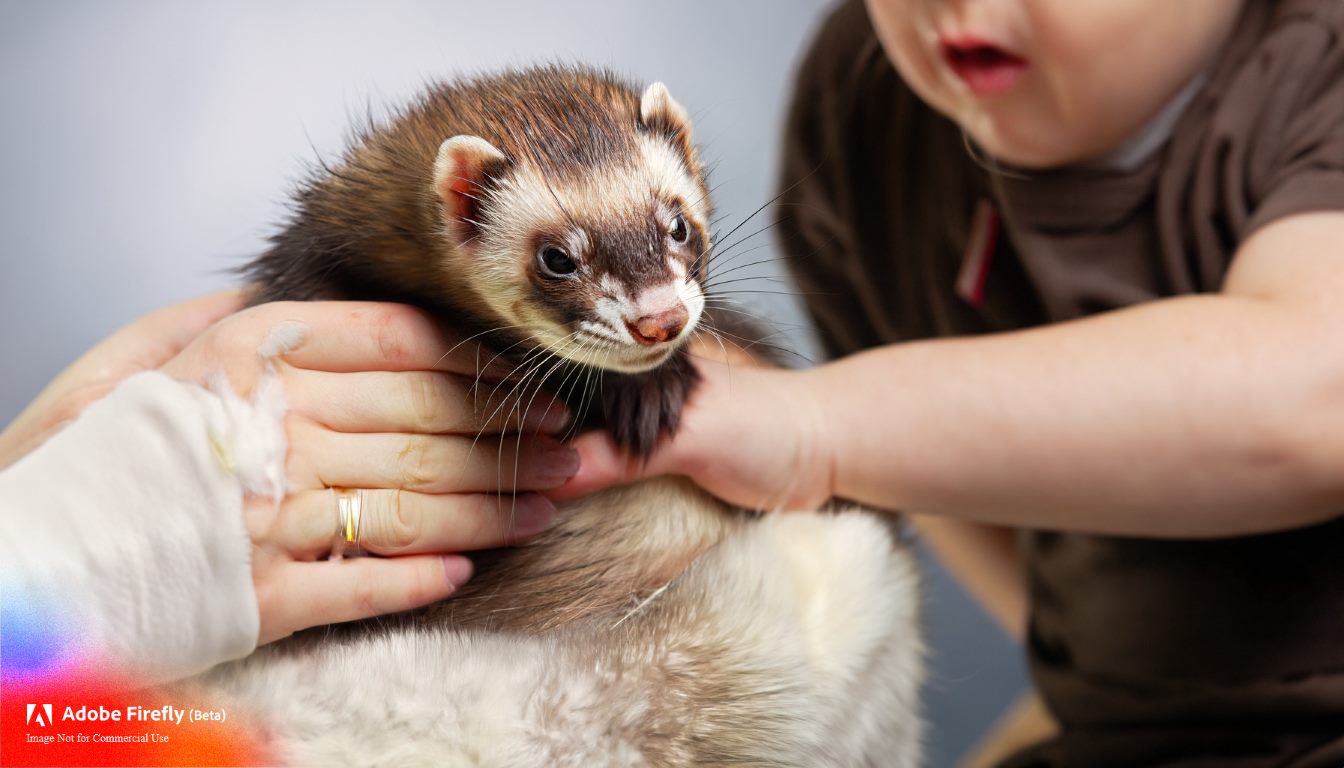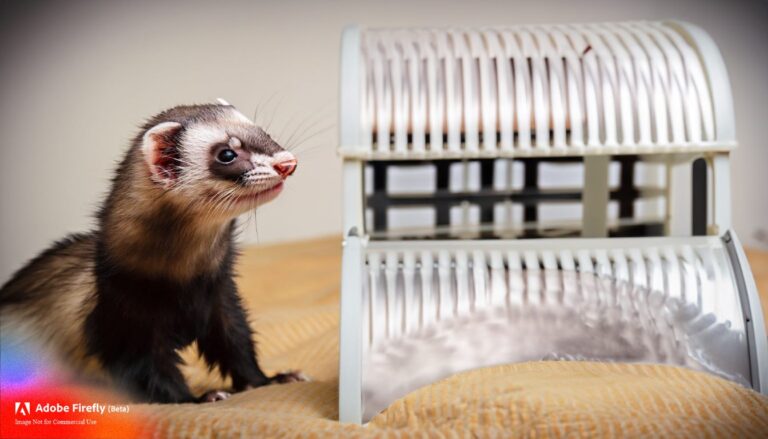
If you are a new ferret owner, or you are considering a ferret, it’s important to know that ferrets can and do get sick. But by being aware of the most common ferret illnesses, you’ll be better prepared to deal with them if and when they happen.

Adrenal disease is an adrenal gland tumor. Some experts believed it may be caused by an interruption of a ferret’s photo cycle (meaning it receives less than eight hours of darkness each night).The first symptoms are hair loss, muscle loss, lethargy, an orangey skin color and weight loss. It is a serious illness but it can be treated with surgery and/or medication.
Blockages of the digestive tract can be caused by hairballs or pieces of other material that get lodged in the digestive tract. Symptoms include a loss of appetite, coughing, vomiting and constipation. You may be able to use a laxative to help your ferret to pass the item. However, if it is a large item, your veterinarian may have to remove it.
Choking is caused by a large item becoming lodged in your ferret’s mouth or throat. Of course, this can be deadly. If possible, remove the item immediately or take your ferret to a vet as soon as possible.
Dental problems in ferrets can be caused by age, a broken tooth or poor hygiene, just as with humans. It is important to clean your ferret’s teeth regularly and to notice whether it has any problems eating. If so, consult your vet.
Disseminated idiopathic myositis (DIM) or Polymyositis is a muscle inflammation disease that seems to be fairly new among ferrets. It usually occurs among ferrets less than one year old. Symptoms include lethargy, weakness, poor appetite, fever, diarrhea, clear nasal discharge, dehydration and enlarged lymph nodes. These symptoms come on quickly and unfortunately, there is as yet no effective cure or treatment. While it does not appear to be contagious, the cause of DIM has yet to be established.
Eosinophillic Enteritis (EE) involves the accumulation of white blood cells in the gastrointestinal walls, usually of male ferrets. These white blood cells are usually produced in response to the presence of a parasite. This illness is usually found when a vet is trying to rule out other disorders in a ferret. EE can be treated but it involves lifelong medications.
Fleas and ear mites are found in ferrets as with many other pets. Once discovered, they can be treated with a variety of commonly available products.
Flu or influenza is similar to flu in humans. Ferrets will develop symptoms like sneezing, coughing, runny noses, wheezing, and diarrhea. Their appetite declines and they spread their germs to others in the business. As with humans, ferrets with the flu need to drink plenty of fluids, rest and keep away from other ferrets. (When you handle the ill ferret, wash your hands frequently.) Flu-like symptoms may actually indicate another illness, so consult your vet if the symptoms persist more than one week.
Insulinoma is cancer of the pancreas. A tumor causes increased insulin production in the pancreas resulting in low blood glucose (also known as hypoglycemia). It can be treated with surgery and/or medications.
Kidney disease/failure becomes increasingly common as ferrets age. The kidneys can no longer function properly and thus allow urea, creatinine, phosphorus and other substances to build up in the blood, which can be fatal to your ferret. There is no cure but treatments are available to help prolong your ferret’s life.
Lymphoma is cancer of the white blood cells. It can affect the bone marrow, eyes, intestines, kidneys, liver, lungs, the nervous system, pancreas, spleen and stomach. While it can be treated with chemotherapy, surgery and/or radiation, it is a very serious illness in ferrets.
Mast cell tumors are common skin tumors that are actually not usually a health risk. Usually there is some hair loss and your ferret may find this type of tumor to be itchy. Your vet can remove them surgically if they are particularly problematic.
Megaesophagus means your ferret’s esophagus (i.e., throat) is dilated. Your ferret will have trouble breathing and swallowing because the esophagus’ muscles no longer work properly. While there is no cure for this ferret illness, there are many treatment options so your ferret can live comfortably.
Proliferative colitis is a bacterial infection that causes dark stools with clear or green mucus. Your ferret may strain to poop and thus have a prolapsed rectum. Left untreated, your ferret may become very lethargic because it will be unable to absorb nutrients from its food. Proliferative colitis can be treated with medicines.
Ulcers are fairly common in ferrets and may or may not be accompanied by symptoms such as bad breath, tooth grinding, tarry stools and/or vomiting. Ulcers can be treated with medicines.
These are the most common illnesses affecting ferrets. Most can be prevented by being vigilant about veterinarian visits, vaccinations, proper hygiene and monitoring your ferret’s habits and condition, such as changes in its appetite and stool.
More Ferret Health Concerns
So there has been a lot of interest in ferret diseases and health problems in ferrets lately. I have already done a few posts on sick ferrets, but it seems that another one is in order.

One reader wanted to know about the mortality rate in ferrets that have periodontal disease. I have researched this and talked to a vet about it. It turns out that periodontal disease is not fatal – if you catch it in time. But if you don’t have it taken care of, the infection will go into the blood stream and then into the kidneys and liver. Very bad for ferrets.
So, just as we humans need to take care of our teeth, we also need to take care of our little fuzzies’ teeth. When you do your ferrets’ daily grooming, add in brushing their teeth. Yes, brush your ferrets’ teeth! It’s also a good way to see if any other illnesses are developing. And remember to take your fuzzies to the vet periodically to have any stubborn tartar build-up removed.
Here, is how to brush a ferret’s teeth:
- Hold it firmly by the scruff of the neck.
- Gently open your ferret’s mouth.
- Use the toothpaste and toothbrush to brush its teeth. Remove any greenish-gray tartar buildup.
- As you brush, check the gums. They should be pink, firm, moist, and smooth. If the gums are red, white, or gray, take your ferret to a veterinarian.
- Rinse the toothbrush and use it to massage the gums.
Keep in mind, too, that fluoride is toxic to ferrets. So always use a ferret-safe tooth paste that does NOT contain fluoride.
Now, another ferret health issue that has been of interest lately is one that involves coughing, weight loss, and constipation. All of these could be signs of blockage in your ferret’s intestines or stomach. Just like cats, ferrets can get hairballs, but unlike cats, they can’t cough them up. The hairball just sits there building up into one large mass.
I give my fuzzies Ferret Lax (which I either order from Amazon or get from my local pet store) twice a week. This helps them pass the hairballs, which they can’t cough up. Rikki and Possum also like the taste.
Summary
Still, prevention is the best cure for hairball problems. I try to brush Rikki and Possum every day, especially during their shedding seasons. The shedding occurs twice a year, spring and fall. For this, I use a brush made for cats.
I want to stress that when you begin to suspect any ferret illness or ferret disease, you should take your fuzzy baby to the vet. This way, you can make sure early on that there isn’t something seriously wrong. Without proper treatment, something as seemingly inconsequential as dirty teeth or hairballs could make your ferret seriously ill or even lead to death.
Take care of your ferret as you would any member of your family – it will reward you with a long, loving life.






